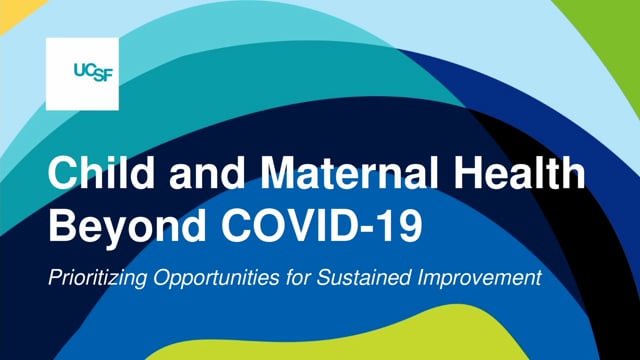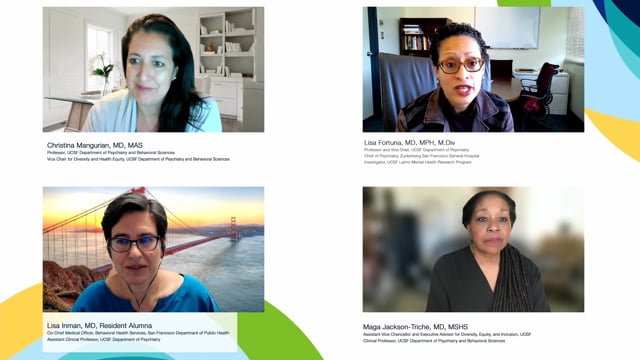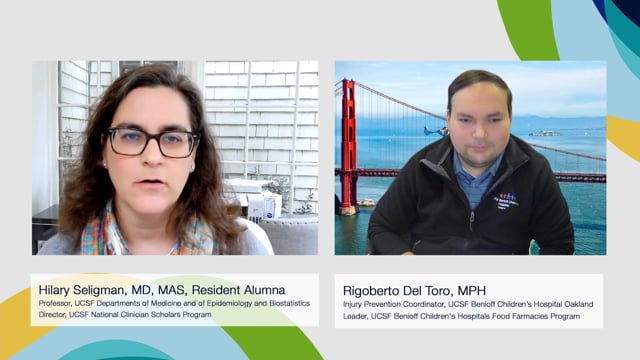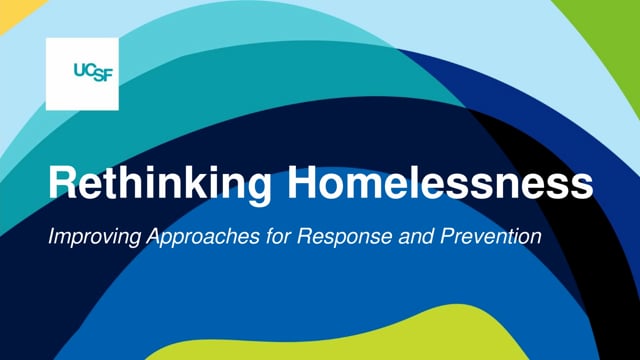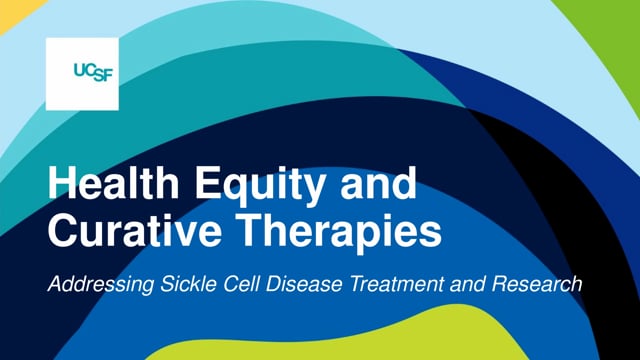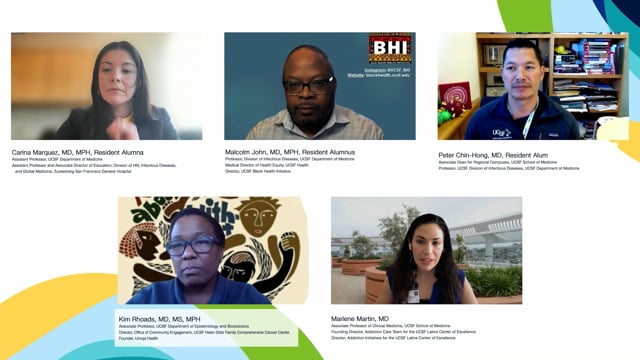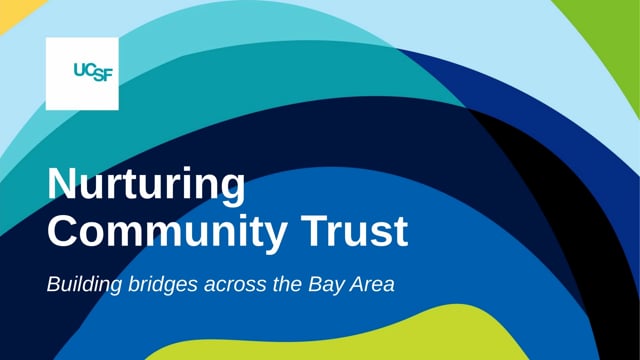
UCSF Health Equity Symposium
Paving the Path Forward to Improve Health for All
Wednesday, March 9, 2022
9:00 a.m. Pacific time
Join us for the 2022 UCSF Health Equity Symposium. This year’s event will examine new developments in community outreach and care-delivery models addressing pre- and post-pandemic health disparities. Hear directly from UCSF experts and health care practitioners on the course forward for community mental health, improving access to care for the homeless, the health implications of food insecurity, and much more.
Agenda - Select session time for details:
Welcome remarks by Renee Navarro, MD '86, PharmD.
Opening Keynote featuring Camara Phyllis Jones, MD, MPH, PhD
Co-Host remarks by Kirsten Bibbins-Domingo, PhD, MD, MAS.
Child and Maternal Health Beyond COVID-19
Prioritizing Opportunities for Sustained Improvement
For years, we’ve seen a direct link between maternal, infant, and child health outcomes and differences in economic and socioeconomic conditions. The pandemic has only exaggerated these discrepancies with its disproportionate toll on communities of color. Hear from UCSF experts about how lessons learned from COVID-19 have created new opportunities to capitalize on promising child and maternal health interventions and promote equitable outcomes.
Moderated by: Alicia Fernandez, MD
- Ifeyinwa Asiodu, RN, MS '12, PhD '14
- Dayna Long, MD
Rethinking Homelessness
Improving Approaches for Response and Prevention
Pandemic relief sent an unprecedented amount of funding toward homeless services, helping to address long-held concerns about the help provided to the most vulnerable members of our communities. In this session, leaders in the field will discuss how these additional resources instilled a new sense of urgency and empowered UCSF faculty members and their community partners to enhance and transform their programs as well as launch innovative initiatives.
- Taylor Cuffaro, RN, MS '20
- Margot Kushel, MD, Resident Alum
Promoting Mental Health Equity
Creating Strategic Partnerships to Shed Light on Mental Health
The pandemic has increased public awareness of mental health issues that long predated COVID-19. Hear from leaders in the field about how UCSF’s strategic partnerships with community agencies like Behavioral Health Services at the San Francisco Department of Public Health strive to keep the discourse on mental health services and equity at the forefront, while helping to chart a course forward.
Moderated by:
- Christina Mangurian, MD '03, MAS '15
Panelists:
- Lisa Fortuna, MD, MPH, Mdiv
- Lisa Inman, MD, Resident Alum
- Maga Jackson-Triche, MD, MSHHS
Addressing Food Insecurity
Transitioning From an Emergency Response to Sustainability
The pandemic’s impact on food security will linger long after the health system stabilizes, resulting in an increased risk for chronic disease development, morbidity, and mortality among food-insecure households. Join food security experts for an intimate profile of UCSF programs and research projects, and learn how faculty leaders are transitioning from pandemic emergency response mode to providing more sustainable food choices and resources to meet the long-term challenges ahead.
- Rigoberto Del Toro
- Hilary Seligman, MD, MAS '06
Health Equity and Curative Therapies
Addressing Sickle Cell Disease Treatment and Research
Sickle cell disease is a blood disorder that affects millions of people around the world, most of them of African descent. Now, UCSF researchers are working together to launch the first human trial using a CRISPR gene-editing technique. Learn from the investigators who are leveraging this new technique to find an affordable solution or cure for this devastating disease that could globally benefit all who need it.
- Mark Walters, MD
- Neha Bhasin, MD
Interventions and Partnerships Beyond COVID-19
Benefiting from Lessons Learned
In this moderated panel discussion, experts across UCSF will examine the lessons learned from strategic community partnerships and interventions developed during the pandemic. Join us to learn next steps for addressing health disparities among communities of color and how UCSF is paving the way forward to confront inequities in health and health care
Moderated by:
Malcolm John, MD, MPH
Panelists:
Peter Chin-Hong, MD '06
Carina Marquez, MD '08
Marlene Martin, MD
Kim Rhoads, MD, MS, MPH, Resident Alum
Nurturing Community Trust
Building bridges across the Bay Area
Given our country’s long history of inequities, trust does not always come easily—and may not come at all. Yet the increasing resilience; new community partnerships; and diversity, equity, and inclusion awareness of the past two years are allowing us to develop trust-building strategies that champion health equity for vulnerable communities. Hear how UCSF is charting the path forward by nurturing community trust and prioritizing health equity for a post-pandemic world.
- Kirsten Bibbins-Domingo, PhD '94, MD '99, MAS '04
- Ayanna Bennett, MD '01
Featuring
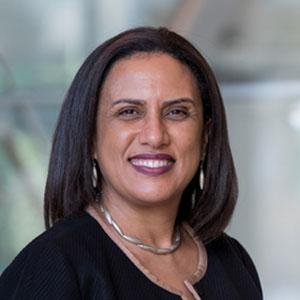
Kirsten Bibbins-Domingo, PhD ’94, MD ’99, MAS ’04, Resident Alumna
Dr. Bibbins-Domingo co-founded the UCSF Center for Vulnerable Populations at Zuckerberg San Francisco General Hospital; the center generates actionable research to increase health equity and reduce health disparities in at-risk populations in the San Francisco Bay Area, as well as throughout California and nationwide. She also is a general internist, cardiovascular disease epidemiologist, and national leader in prevention strategies and interventions to address health disparities.
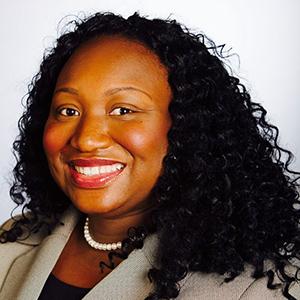
Ifeyinwa Asiodu, RN, MS '12, PHD '14
As a researcher, registered nurse, and lactation consultant, Dr. Asiodu investigates the intersection of racism, systemic and structural barriers, life course perspectives, and human milk and lactation issues. The long-term goal of her research is to reduce infant feeding disparities and to increase access within Black communities to high-quality lactation support, human milk feeding care, and equitable contraception services.
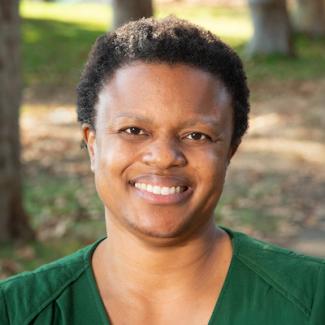
Ayanna Bennett, MD ’01
Dr. Ayanna Bennett has worked at SFDPH as a physician, medical director, and executive leader over the last 17 years. Most recently, she is the founding Chief Health Equity Officer and Director of the Office of Health Equity (OHE) at SFDPH which launched in 2019. As Director of OHE, Dr. Bennett oversees a team that does anything and everything that serves to advance equity in all aspects of the department’s work. The OHE team produces and implements training events, coaches leadership and staff, supports data development and evaluation, develops and reforms policy, manages multidisciplinary programs, and works to improve community inclusion. In 2020, Dr. Bennett devoted most of her time to the COVID-19 response and development of the SFDPH Racial Equity Action Plan.
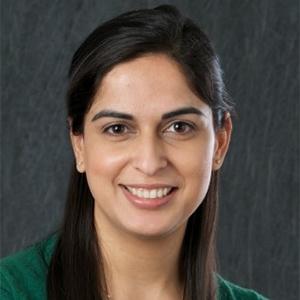
Neha Bhasin, MD
Neha Bhasin, MD is an Assistant Professor of Pediatrics at UCSF Benioff Children’s Hospital Oakland. She is a Pediatric Hematologist/Oncologist who specializes in pediatric hematology and is the director of the Pediatric Comprehensive Center for Sickle Cell Disease at UCSF. Her work focuses on providing optimal education and care to patients and families affected with sickle cell anemia, which is an inherited blood disorder. She works to improve care for her patients in her clinic, in the regional sickle cell collaborative and nationwide. She aims to identify key areas of improvement in her patients and implement changes to improve the care of individuals with sickle cell anemia. Dr. Bhasin earned her medical degree at Ross University School of Medicine. She completed her residency in pediatrics at Stony Brook Medicine and completed her fellowship training at the University of Iowa where she also earned a certificate in clinical and translational research.
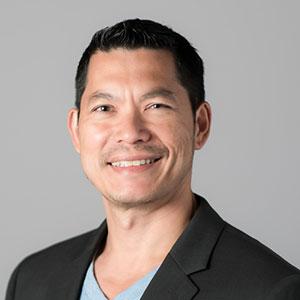
Peter Chin-Hong, MD, Resident Alum
Dr. Chin-Hong specializes in treating infectious diseases, with a focus on infections that develop in immunosuppressed patients, such as recipients of organ and stem cell transplants, particularly HIV-positive recipients of organ transplants. He also studies the human papillomavirus, Chagas disease, and viral and fungal infections in patients with suppressed immune systems.
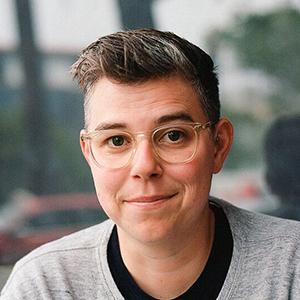
Taylor Cuffaro, RN, MS ’20
Cuffaro is an adult gerontology primary care nurse practitioner, with a focus on HIV/AIDS and psychiatric/mental health. They co-founded UCSF Street Nursing, a street-based practice that provides RN-scope care to people experiencing houselessness in San Francisco and Oakland. They also co-founded and run an elective in the UCSF School of Nursing focused on the theory and skills of providing robust nursing care on the streets. Before coming to UCSF, Cuffaro was a longtime harm reductionist, working in substance use research, syringe access services, and HIV testing and linkage to care.
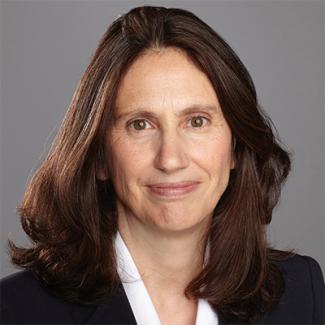
Alicia Fernandez, MD
Alicia Fernandez, M.D., is Professor of Medicine at UCSF and a general internist at Zuckerberg San Francisco General Hospital. She is the founding Director of the UCSF Latinx Center of Excellence, and Associate Dean of Population Health and Health Equity. Dr. Fernandez directs the Latinx and Immigrant Health Research Program at the UCSF Center for Vulnerable Populations which generates actionable research to increase health equity and reduce health disparities.
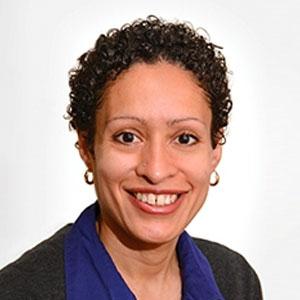
Lisa Fortuna, MD, MPH, M.Div
Dr. Fortuna specializes in psychiatry with children, adolescents, and adults who are traditionally underserved, as well as in addiction medicine. Her work spotlights community psychiatry, which seeks to provide mental health support services to people and families through community resources. She also treats and researches post-traumatic stress and substance-use disorders. For more than two decades, Dr. Fortuna has championed health equity, which is achieved when everyone has the same opportunity to reach their best state of health, and no one is disadvantaged from doing so by their social circumstances. Her work encompasses immigrant mental health, access to care, and implementation of solutions to improve the quality of care and address health care disparities. Dr. Fortuna’s research has expanded access to child behavioral health in primary care settings, and her Kids FACE FEARS study on treating childhood anxiety showed that combining online and in-person care can improve access to treatment.
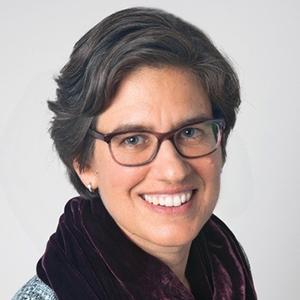
Lisa Inman, MD, Resident Alumna
Lisa Inman, MD completed her training in Adult Psychiatry and Child and Adolescent Psychiatry at UCSF before she started working with SFDPH Behavioral Health Services as a child and adolescent staff psychiatrist. Since 2010, she has partnered with UCSF on the Community Psychiatry rotation for the Child and Adolescent Psychiatry Fellowship Program, and she has continued that partnership with the Public Psychiatry Fellowship Program at Zuckerberg San Francisco General Hospital. In her current role at Behavioral Health Services, she focuses on recruiting, hiring, and supporting an inclusive workforce, improving access to services and addressing health equity.
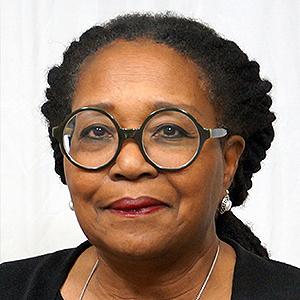
Maga Jackson-Triche, MD, MSHS
Dr. Jackson-Triche is a clinical professor of psychiatry at the UCSF School of Medicine. Prior to being named assistant vice chancellor, she was the vice chair for adult psychiatry at UCSF and the vice president for adult behavioral health services at UCSF Health; in those positions, she played a crucial role in integrating clinical mental health services across UCSF’s campuses and led a significant expansion of psychiatric and behavioral services across the UCSF Health system. In addition, she oversaw overall quality, effectiveness, efficiency, and financial performance for clinical affairs within the Department of Psychiatry and Behavioral Sciences. She was named a winner of the 2020 UCSF Excellent Physician Award.
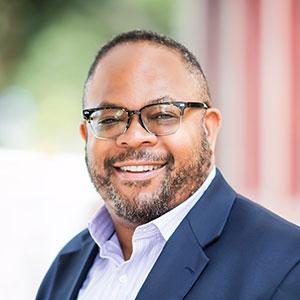
Malcolm John, MD, MPH, Resident Alumnus
Dr. John is an infectious disease physician; his work focuses on advancing care for vulnerable populations, examining ethnic and age differences in HIV clinical outcomes and comorbidities, reducing health care disparities, and promoting health equity. He launched the UCSF Black Health Initiative in 2020 to help UCSF be a better partner with the Black community in addressing COVID-19 and related disparities.
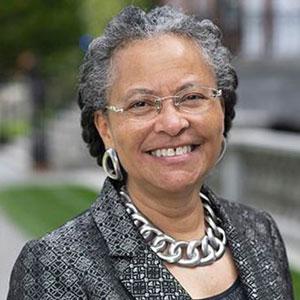
Camara Phyllis Jones, MD, MPH, PhD
Dr. Jones is a physician, epidemiologist, and anti-racism activist who specializes in the effects of racism and social inequalities on health. Her work focuses on naming, measuring, and addressing the impacts of racism on health and well-being. As the recipient of this year’s UCSF Presidential Chair, Dr. Jones is engaging with UCSF partners to create an equity road map to recognize and rectify historical injustices, as well as to identify ways in which the UCSF community can act to dismantle racism.
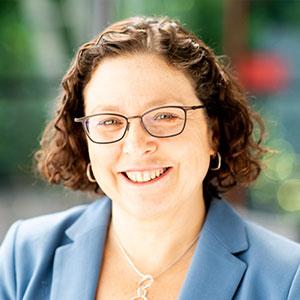
Margot Kushel, MD, Resident Alumna
Dr. Kushel’s research focuses on reducing the burden of homelessness on health by examining efforts to prevent and end homelessness and on mitigating the effects of housing instability on health care outcomes. She uses a variety of research methodologies to inform the development of programs and policies to end homelessness by aiming to understand the complex interactions between health and housing. She also has a particular interest in homelessness in older adults and homelessness in medically complicated individuals.
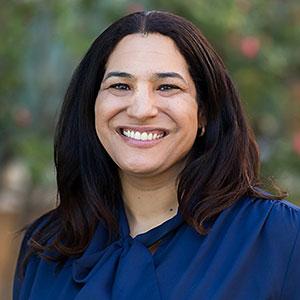
Dayna Long, MD, Resident Alumna
Dr. Long is primary care pediatrician dedicated to eliminating childhood health inequities that lead to poor health, financial, and educational outcomes for families and young children on both individual and population levels. She founded the Family Information and Navigation Desk (FIND) program, along with the FINDconnect technology platform, to address the social and environmental factors affecting children’s health.
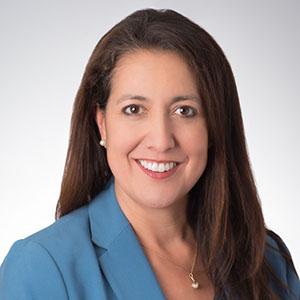
Christina Mangurian, MD ’03, MAS ’15
Dr. Mangurian is a community psychiatrist whose research focuses on reducing health care disparities among racially diverse and underserved minority populations with severe mental illness. She also studies ways to support the advancement of women and minorities within medicine.
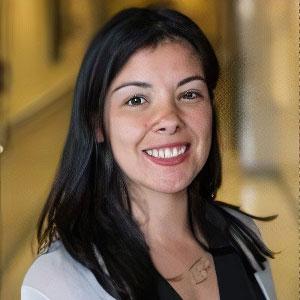
Carina Marquez, MD ’08, MPH, Resident Alumna
Dr. Marquez’s research focuses on COVID-19 epidemiology in Latinx communities and testing and vaccination interventions to reduce disparities in care. She is a co-founder of Unidos en Salud, a community-academic-city partnership among the Latino Task Force, UCSF, UC Berkeley, and the CZ Biohub; it provides COVID-19 vaccines to all eligible individuals who live, work, or spend time in San Francisco.
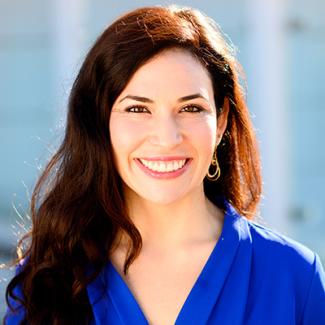
Marlene Martin, MD
Marlene Martin, M.D., is Associate Professor of Clinical Medicine at UCSF and a hospitalist at San Francisco General Hospital. She is the founding Director of the Addiction Care Team and Director of Addiction Initiatives for the UCSF Latinx Center of Excellence. She is also a UCSF Bridges coach for the SJV PRIME students. https://profiles.ucsf.edu/marlene.martin
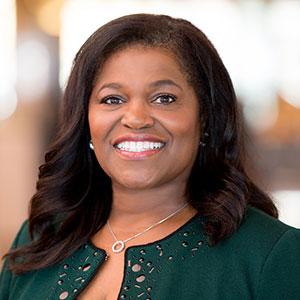
Renee Navarro, MD ’86, PharmD, Resident Alumna
Trained as an anesthesiologist, Dr. Navarro now collaborates with faculty, staff, and students to develop and carry out strategic plans for diversity and inclusion – including recruitment and retention. She works to address issues of diversity that cut across faculty, student, staff, and operational lines. Dr. Navarro also worked with students to establish the UCSF Multicultural Resource Center, providing space and resources that support interprofessional collaboration among underrepresented faculty, staff, trainees, and students.
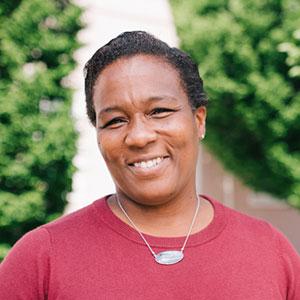
Kim Rhoads, MD, MS, MPH
Dr. Rhoads’s background and scholarly work encompass the full cancer continuum, including basic science, clinical care in colorectal surgery, health services research in cancer disparities, and training in health policy. Before joining the faculty at UCSF, she founded the Community Outreach and Engagement program at the Stanford Cancer Institute. She views community engagement and institutional partnerships as substantive pathways to promoting health equity and eliminating disparities.
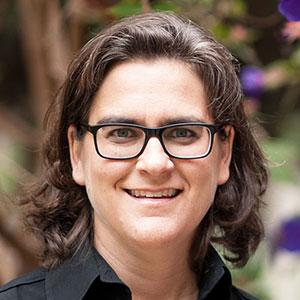
Hilary Seligman, MD, MAS ’06, Resident Alumna
Dr. Seligman is an expert in food insecurity and its health implications across the life course. Her policy and advocacy expertise focuses on federal nutrition programs (particularly the SNAP “food stamp” program), food banking and the charitable food network, hunger policy, food affordability and access, and income-related drivers of food choice. She also founded EatSF, a healthy foods voucher program for low-income residents of San Francisco, and is the senior medical advisor for Feeding America.
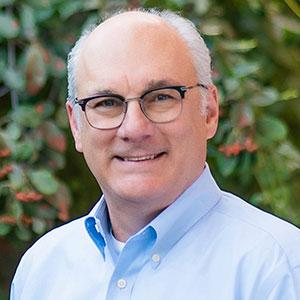
Mark Walters, MD
Dr. Walters is a hematologist-oncologist who cares for children with blood disorders and cancer and specializes in blood and bone marrow transplants. His research focuses on transplant and gene therapy for sickle cell disease and thalassemia, and his goal is to offer a curative therapy to every child he treats.
